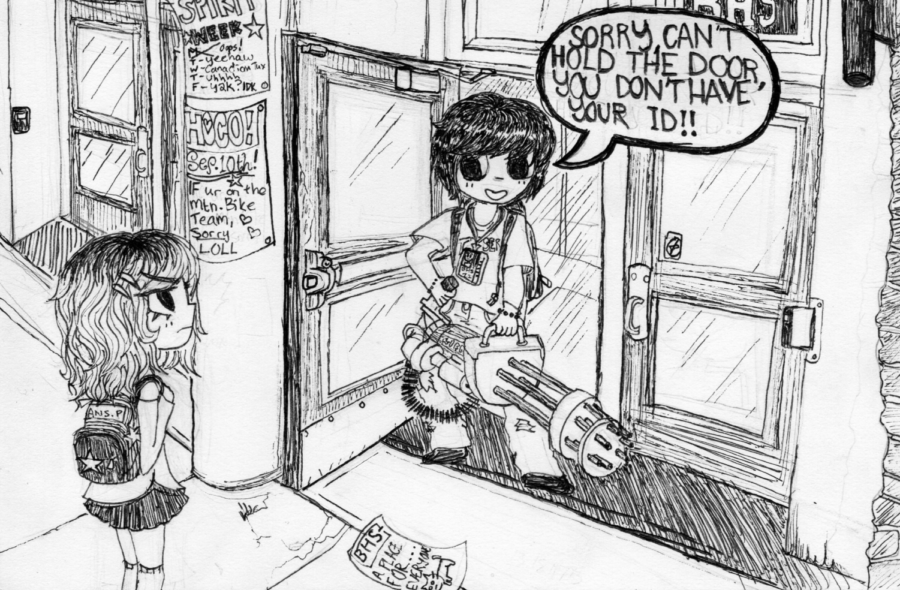Psst… the Doors Aren’t the Problem
With the chances of a shooter having an ID, is this policy effective, or merely security theater?
A 9:30 bell shrieks as the class clambers to the dusty rows of the auditorium. Five hundred-plus students sit down for what is a new year of high school — a particular forte full of “hey over here!” and “sit down’s.” Suddenly, a full, booming voice (also known as Mr. Cawfeild) silences the crowd with the new set of changes soon to be enforced at Boulder High School. For one, student IDs will be checked upon arrival at the building. The front doors will be the only place of entry to the campus, with the threat of consequences (even, perhaps, criminal charges). Students look to each other—hushed and maddened—as anger fills the auditorium.
The new doors policy is, ultimately, a choice the school administration made to prioritize student safety. Boulder High’s new principal Dr. Morales noted that gun violence in schools in the past six months, along with several security issues at Boulder High, made the administration question current enforcement of safety policies, despite how KI-R, the BVSD policy that governs doors, has been in place since 2014.
The real core of the problem is guns, which schools do not have the authority to regulate. When other nations have enacted gun control, mass shootings virtually stop, according to NPR. In the United States, the BBC reports the National Rifle Association as one of the most influential political lobbyists; in the 2020 election cycle, the group spent over $300 million total, according to Open Secrets, despite being on the path to bankruptcy. Passing firearm legislation is remarkably difficult.
This is nothing new in America. In fact, there are more guns than people in the United States, according to a new study of global firearm ownership. Romanticization and de-stigmatization in history have led to heightened and distorted views of gun usage, and the day-to-day use of weapons. Gun usage is idealized in movies, video games and language. Children, commonly men, are told to “go kill it” or “beat’em to a pulp” as a form of positive reinforcement — a harmful cycle of affirmation. Analyzing language does not dictate whether someone is to become a school shooter or not, but rather an emphasis on how American culture has ingrained violence into its children.
According to the GAO, school shootings are often carried out by students (or former students) of the school. This makes policies surrounding these situations seem ridiculous — a shooter would know what lockdown procedure is, or when passing periods are. Moreover, a shooter could very well have an ID. Many students have recounted that peers outside of Boulder High also have IDs and unverified rumors speculate that IDs from previous years work as well. One student even reported showing a debit card to administration who let the student pass. This new identification policy is painstakingly fussy for everyone involved.
In some ways, this new enforcement of the door policy feels reminiscent of the infamous “duck and cover” routine, which had students cower under desks during atomic bomb drills during the Cold War. Schools were obviously powerless to engage in international nuclear peace deals, and parents (and faculty) were worried about the catastrophic violence that seemed just on the horizon. “Duck and cover” allowed the illusion of security, even if in reality a hardwood desk won’t stop nuclear fallout.
Of course, school shootings are an actual, repeated threat. Parents, students and faculty all have valid concerns about safety that are concerns no one should have to have. These new policies have the potential to make the school safer. Still, the only substantial change that can make a school safe from gun violence is the strict regulation of firearms. Adding the door and ID policies to students’ lives only makes them think even more about an already terrifying reality.
Logistically, the policy is ineffective and frustrating: the school has 56 external doors, but the administration has said (and often reinforced with large posters on the doors themselves) that the student body can only use four of them. Dr. Morales noted that a Fairview student was able to enter the building when someone brought out the trash. Does this mean that the understaffed janitors now must exit through the front doors, walk all the way around the school to the dumpsters, and then back again? Over 2,000 people cannot function with one entry (case in point: the senior lot at the end of the day).
The door policy, in its essence, victimizes — and even threatens to criminalize — students in an effort to keep them safe. Even if a student were to hold open a door for a shooter, the fault would rest squarely on the human being who actively kills another (and, of course, on the society that deems a machine gun more important than its fellow people).

Hannah (rhymes with fauna!) Cohen is ecstatic to be working on the Owl for her third and final year. She loves stories in all their forms, but she mostly has opinions on obscure podcasts and which New York Times opinion columnists are defacing the good name of journalistic analysis. When not busy with stumbling through sheet music, editing nonfiction for jGirls+ Magazine, or seeking out the cheapest bluegrass venue, Hannah enjoys wandering around the mountains with her friends and lovely labradoodle. Although she's slightly preferential to the sweeter, more robust taste of red grapes, she knows that the bliss of biting into a crunchy grape transcends color.

Leah Frankel is the Arts & Entertainment editor for The Owl and a senior at Boulder High School. Outside the bustling atmosphere of the newspaper room, she co-leads Navig8 at the Boulder JCC and volunteers at their Milk & Honey Farm. She’s a returning fellow at Kol Koleinu, a national Jewish-feminist group moving towards social work. Leah is a middle child of three girls and has been interested in both social justice issues and writing from a young age. In her free time, she loves to sing Ella Fitzgerald, paint, read at her cabin in Rocky Mountain National Park, hike with friends, and listen to a wide range of music! “I’m solidifying a real community here at The Owl. I can share...


